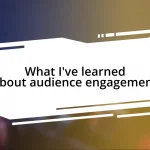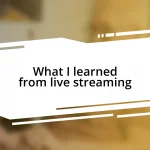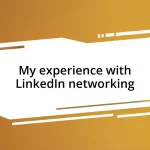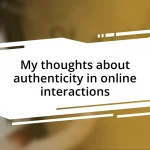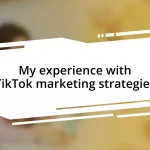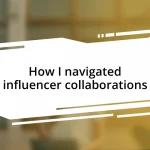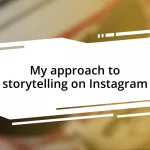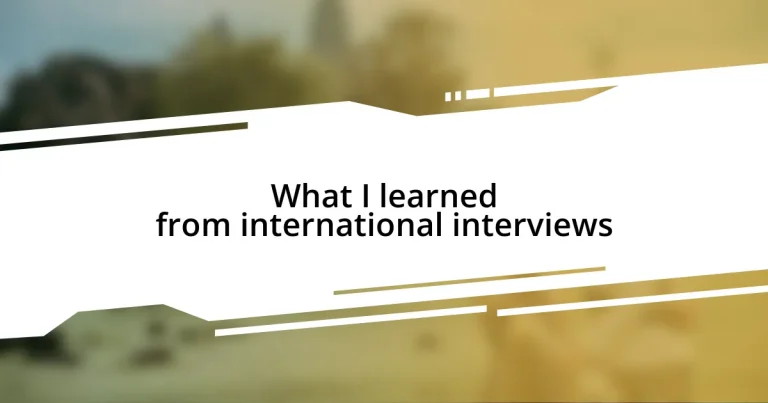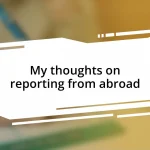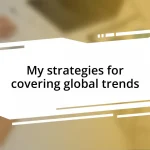Key takeaways:
- Researching company culture and interview norms is essential for success in international interviews.
- Effective communication includes clarity, active listening, and tailoring your style to match the interviewer.
- Post-interview reflection and seeking constructive feedback can improve future performance.
- Networking after interviews is crucial for nurturing relationships and creating opportunities.
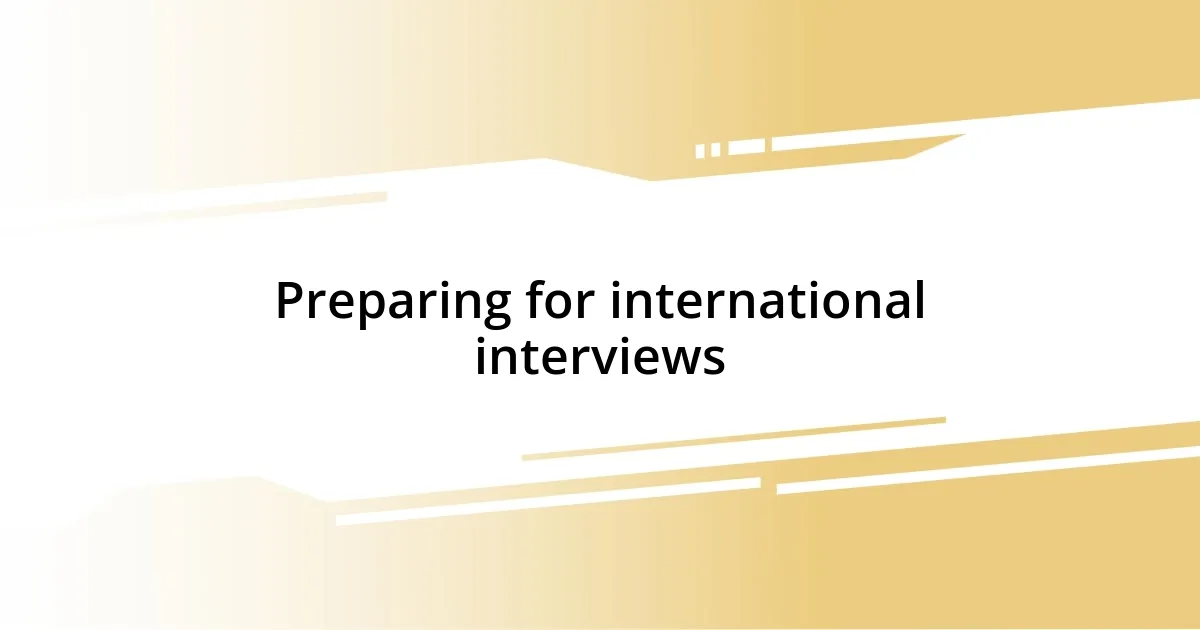
Preparing for international interviews
When preparing for international interviews, it’s imperative to research both the company and the culture of the country you’re interviewing with. I remember one particular interview where I stumbled over cultural norms; I didn’t realize how important personal rapport was in that country. Have you ever faced a moment where you could sense the vibe was just off? It made me appreciate the nuances of cultural etiquette that can impact your chances.
I also found it essential to practice common interview questions while being mindful of how they might be received in different cultures. For instance, in some places, discussing salary expectations can seem forward, while in others, it’s standard practice. How do you adjust your responses based on the cultural context? I learned to frame my answers in a way that showed respect for the interviewer’s values and expectations.
Finally, honing your language skills can be a game-changer. I had a friend who aced her interviews in English, despite it being her second language, simply because she took the time to polish her proficiency. Have you ever had to communicate in a language that wasn’t your native one? Just remember, confidence in your language abilities can greatly influence how you’re perceived globally, and it’s okay to embrace your learning process along the way.
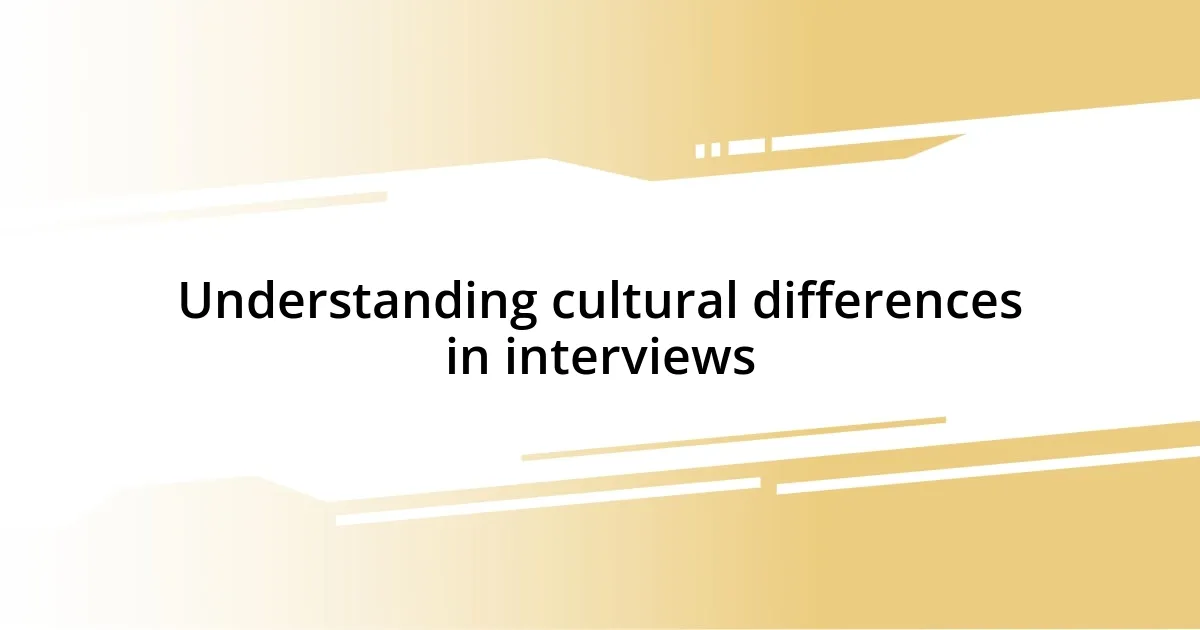
Understanding cultural differences in interviews
Understanding cultural differences in interviews is an eye-opening experience. I recall preparing for an interview in Japan where bowing and maintaining proper eye contact were crucial. This reminded me that what might be considered polite in one culture, like a firm handshake, could be perceived differently elsewhere. There was a palpable tension in the air during the interview, and I realized that these unspoken cultural cues were essential to my success.
To navigate these differences effectively, here are some key points to consider:
- Non-verbal communication: Gestures, facial expressions, and posture can vary significantly across cultures. I learned to pay attention to these signals.
- Hierarchy and respect: In some cultures, addressing someone by their title rather than their first name shows respect. This was an adjustment I had to make in my own interview experiences.
- Question styles: I noticed that direct questions could be perceived as rude in some cultures. Adopting a more indirect approach helped me build rapport.
- Pacing of conversation: In certain cultures, silence can be a sign of thoughtfulness rather than awkwardness. I had to resist the urge to fill every pause with chatter.
- Follow-up etiquette: After the interview, sending a thank-you note might be standard in one culture but may not be expected in another. I learned to tailor my follow-ups based on what I understood about cultural norms.
Embracing these nuances made me not only a better candidate but also a more culturally aware individual.
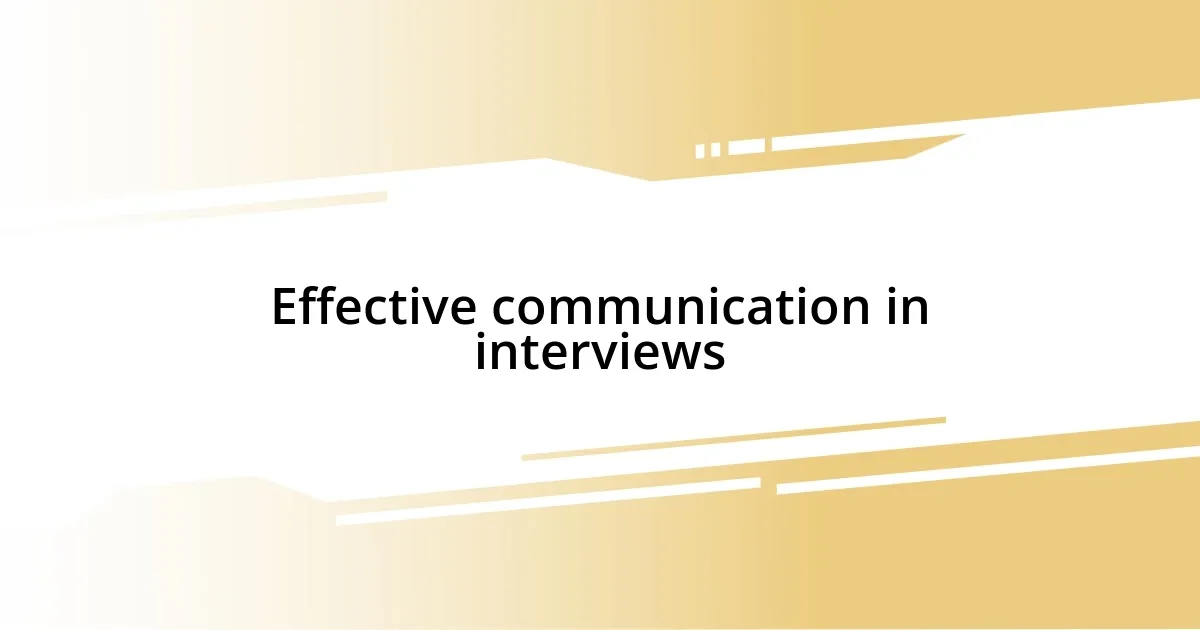
Effective communication in interviews
Effective communication in interviews goes beyond just speaking; it’s about connecting on a deeper level. I remember one instance where I felt the interview was flowing well until I realized I was using jargon that the interviewer didn’t seem to grasp. This moment taught me the importance of clarity and simplicity. Have you ever noticed how some technical terms just don’t translate well? I make it a point now to communicate in a way that’s relatable and ensures the other person feels included in the conversation.
Another critical aspect is actively listening. During one interview, I focused too much on my replies and missed the chance to engage with the interviewer’s points. This experience highlighted the need for an interactive dialogue rather than a one-sided presentation. I believe that genuine engagement helps build rapport and shows that you value the other person’s input. Asking clarifying questions or paraphrasing their statements helps establish a mutual understanding. Have you ever caught yourself nodding along but not really hearing? It can be a game-changer when you make a conscious effort to listen.
Moreover, tailoring your communication style to match the interviewer’s cues is something I’ve found incredibly effective. For instance, if I noticed the interviewer was straightforward and to the point, I aimed to mirror that approach. I’ve discovered that this can create a sense of synergy that makes the conversation feel more fluid. Have you ever adjusted your tone or pace based on someone else’s? It’s fascinating how small changes can lead to more effective interactions.
| Key Aspect | Description |
|---|---|
| Clarity | Use simple language to ensure understanding. |
| Active Listening | Engage in the conversation and respond to cues. |
| Tailored Communication | Adjust your style to match the interviewer’s approach. |
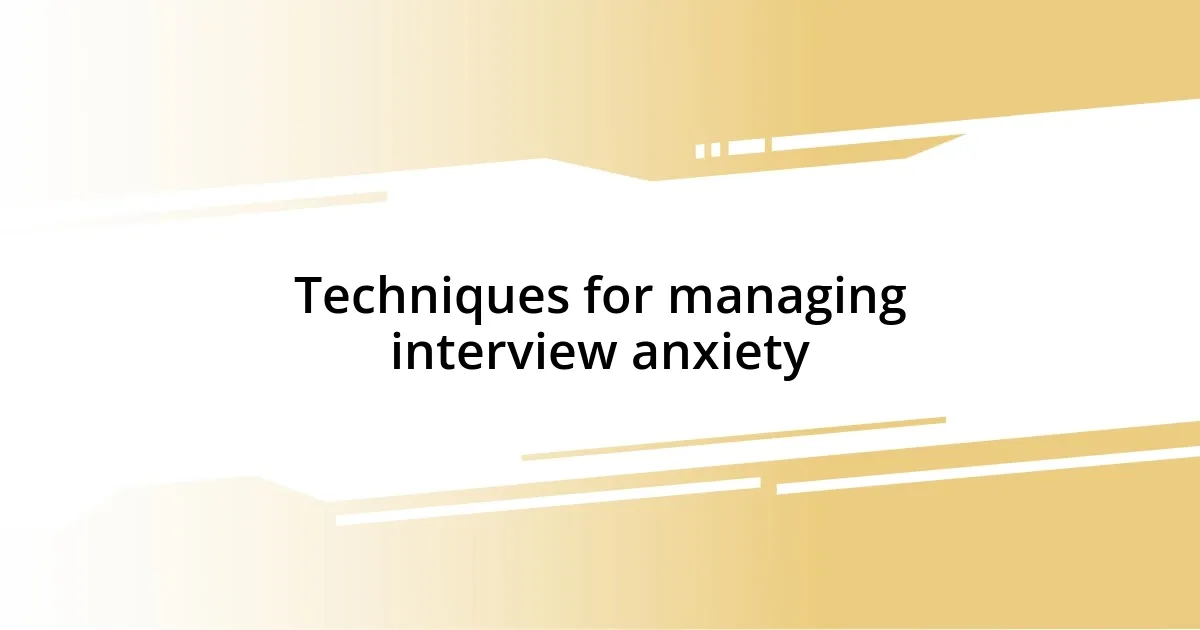
Techniques for managing interview anxiety
Managing interview anxiety is something I’ve had to tackle as I navigated various international interviews. One technique that significantly helped me was visualization. Before one particularly daunting panel interview, I took a few moments to close my eyes and picture myself walking in confidently, addressing each question with poise, and leaving the room feeling accomplished. It sounds simple, but this mental rehearsal set a positive tone and calmed my nerves before the real moment.
Breathing exercises also became a go-to strategy for me. I vividly remember a time when my heart raced uncontrollably just moments before I was called in for an interview. I practiced deep, slow breaths—inhale for four counts, hold for four, and exhale for four. This rhythm not only steadied my heart but also cleared my mind, allowing me to focus on the conversation rather than my anxiety. Have you ever noticed how a few mindful breaths can change your perspective?
Finally, I found that preparing questions to ask at the end of the interview eased my anxiety. Knowing I could turn the spotlight back on the interviewer relieved much of the pressure. During one interview, I asked about the company culture, which opened up a relaxed dialogue and shifted my focus from worry to genuine curiosity. It transformed the entire atmosphere, and I walked away feeling much more positive about the experience. Isn’t it amazing how preparation can turn a daunting situation into an engaging conversation?
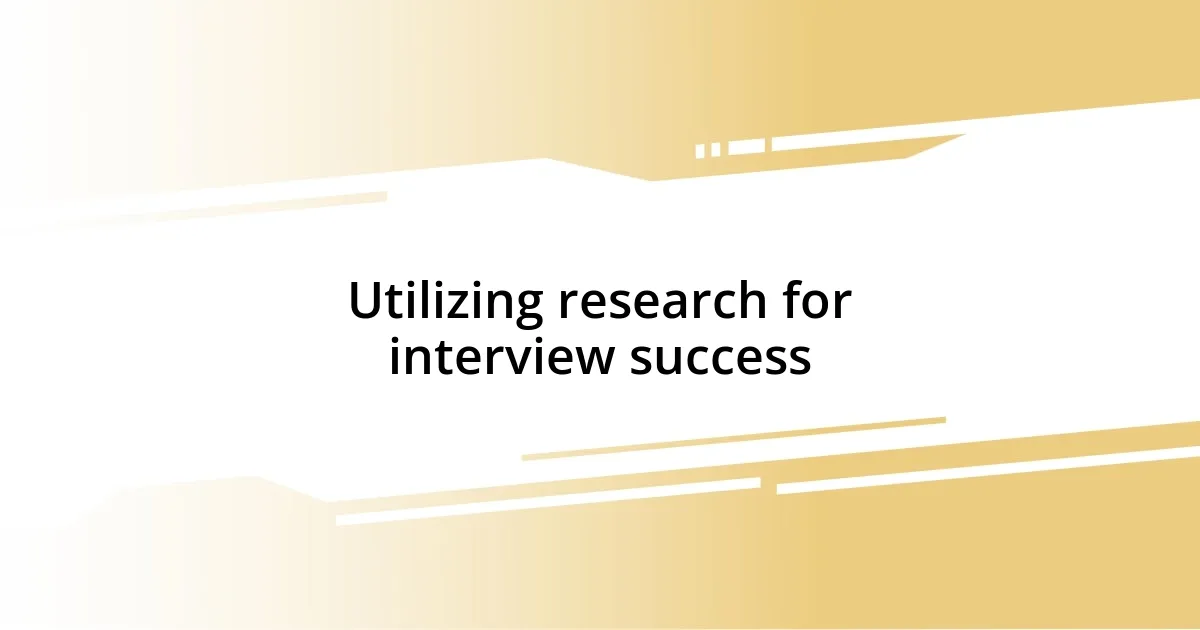
Utilizing research for interview success
Utilizing thorough research can be a game-changer in interviews. I can recall preparing for a position with a company whose values resonated with me. Delving into their latest projects and recent news made me feel more connected and informed during the discussion. So, have you ever walked into an interview feeling like you could hold your own on any topic? It’s that level of comfort and knowledge that allows for deeper conversations and a genuine rapport.
I also learned the importance of researching the interviewer. Understanding their background and interests can spark meaningful dialogue. For instance, in one interview, I discovered a shared passion for sustainability with my interviewer. This common ground not only relaxed the atmosphere but also transformed our interaction into a collaborative exchange rather than a formal Q&A. How often do we overlook such opportunities to bond over shared interests?
Finally, I emphasize the role of industry trends in shaping my responses. During a particularly insightful interview, discussing the latest trends with confidence helped me illustrate my understanding of the market. I remember the interviewer lighting up when I mentioned a recent advancement in the industry, which prompted a lively debate. That moment reinforced my belief that informed candidates stand out. Have you ever wondered how a simple reference to current events can impact the tone of an interview? It’s all about creating connections that leave a lasting impression.
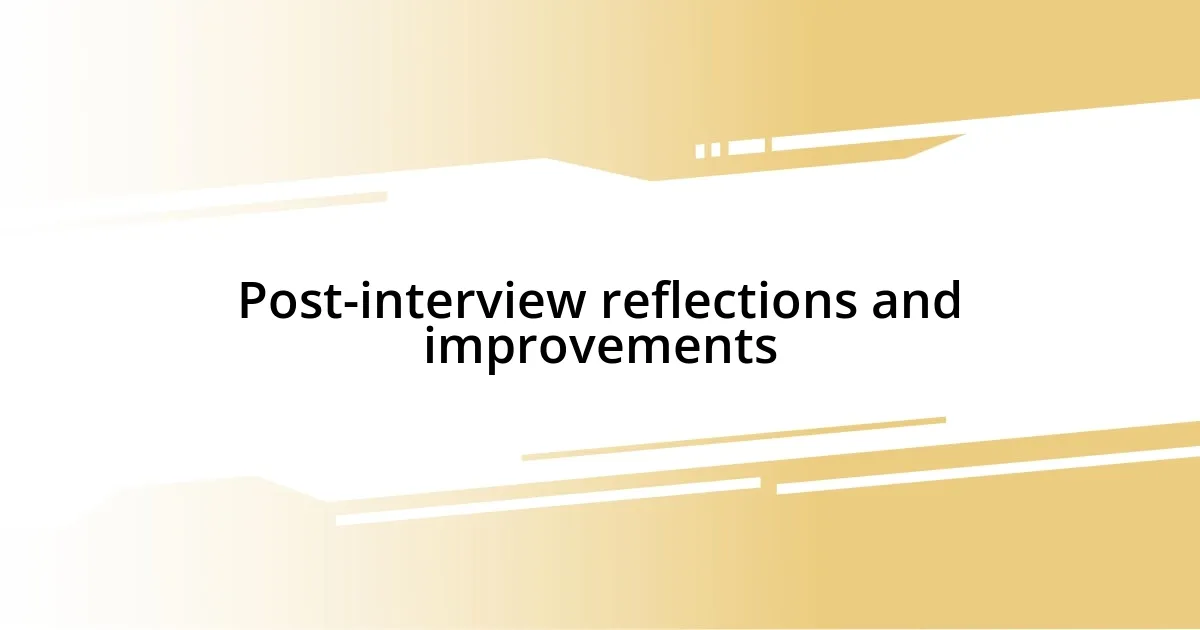
Post-interview reflections and improvements
After each interview, I always take a moment to reflect on what went well and what didn’t. I remember once walking out of an interview where I stumbled over a question about my experience. Instead of dismissing it as a failure, I saw it as an opportunity. I now keep a journal to note these moments, which has become invaluable for identifying patterns and areas for improvement. Have you ever noticed how reflecting on your experiences can transform your approach in the future?
I also believe in the power of seeking constructive feedback. After one international interview, I reached out to a mentor who had experience in the field. Their insights helped me see blind spots I hadn’t considered. This exchange not only provided me with a fresh perspective but also reinforced the idea that we can always grow. Don’t you agree that outside opinions often shed light on our blind spots?
Lastly, I focus on building my resilience. There have been times when I felt disheartened after interviews that didn’t go as planned. Rather than wallowing in self-doubt, I remind myself of my strengths and past successes. I often ask myself, what did I learn from this experience? By reframing failure as a stepping stone, I find the motivation to prepare better next time. Isn’t it empowering to know that every setback is just a setup for a comeback?
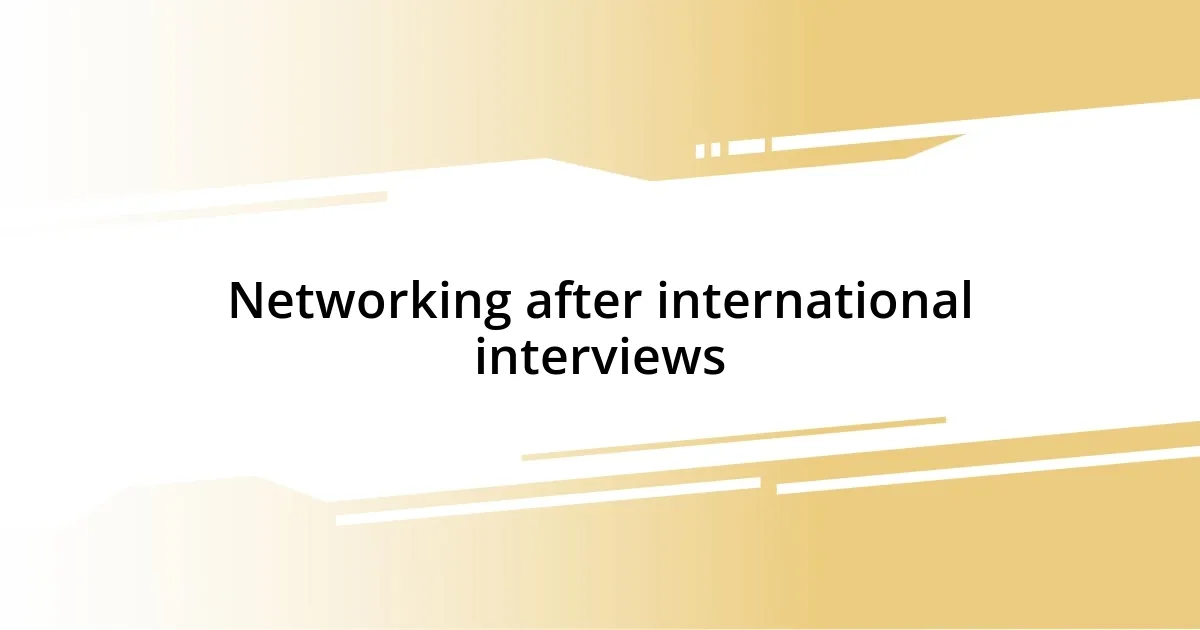
Networking after international interviews
Networking after international interviews can be a powerful tool for nurturing professional relationships. I remember following up with an employee I met during an interview in Canada. We had such a great conversation about our mutual interests that I decided to send a personalized LinkedIn request. This simple gesture not only kept the connection alive but opened doors to further discussions about team dynamics and future projects. Have you ever thought about how a brief chat can evolve into something greater just by maintaining contact?
In my experience, staying in touch is just as crucial as making that initial connection. After one interview, I sent a thank-you email and expressed my appreciation for the opportunity to connect. I made sure to reference our conversation about cultural differences in the workplace, which kept the dialogue going. It felt rewarding when I received a reply sharing more insights on the topic. It’s fascinating how these ongoing conversations can cultivate a network that not only offers support but also personal growth. Isn’t it interesting how a simple thank-you can turn into a meaningful exchange?
Moreover, I’ve discovered that attending international industry events can significantly enhance my networking efforts post-interview. At a recent conference, I bumped into an interviewer from a previous recruitment process. The familiarity from our earlier encounter eased our conversation, making it a comfortable exchange rather than a formal introduction. Seeing familiar faces in an international setting can reignite professional relationships and remind us that the world is smaller than we think. How do you feel about reconnecting with someone in a different context? It can often lead to unexpected opportunities.
